I've got an Athena table where some fields have a fairly complex nested format. The backing records in S3 are JSON. Along these lines (but we have several more levels of nesting):
CREATE EXTERNAL TABLE IF NOT EXISTS test (
timestamp double,
stats array<struct<time:double, mean:double, var:double>>,
dets array<struct<coords: array<double>, header:struct<frame:int,
seq:int, name:string>>>,
pos struct<x:double, y:double, theta:double>
)
ROW FORMAT SERDE 'org.openx.data.jsonserde.JsonSerDe'
WITH SERDEPROPERTIES ('ignore.malformed.json'='true')
LOCATION 's3://test-bucket/test-folder/'
Now we need to be able to query the data and import the results into Python for analysis. Because of security restrictions I can't connect directly to Athena; I need to be able to give someone the query and then they will give me the CSV results.
If we just do a straight select * we get back the struct/array columns in a format that isn't quite JSON. Here's a sample input file entry:
{"timestamp":1520640777.666096,"stats":[{"time":15,"mean":45.23,"var":0.31},{"time":19,"mean":17.315,"var":2.612}],"dets":[{"coords":[2.4,1.7,0.3], "header":{"frame":1,"seq":1,"name":"hello"}}],"pos": {"x":5,"y":1.4,"theta":0.04}}
And example output:
select * from test
"timestamp","stats","dets","pos"
"1.520640777666096E9","[{time=15.0, mean=45.23, var=0.31}, {time=19.0, mean=17.315, var=2.612}]","[{coords=[2.4, 1.7, 0.3], header={frame=1, seq=1, name=hello}}]","{x=5.0, y=1.4, theta=0.04}"
I was hoping to get those nested fields exported in a more convenient format - getting them in JSON would be great.
Unfortunately it seems that cast to JSON only works for maps, not structs, because it just flattens everything into arrays:
SELECT timestamp, cast(stats as JSON) as stats, cast(dets as JSON) as dets, cast(pos as JSON) as pos FROM "sampledb"."test"
"timestamp","stats","dets","pos"
"1.520640777666096E9","[[15.0,45.23,0.31],[19.0,17.315,2.612]]","[[[2.4,1.7,0.3],[1,1,""hello""]]]","[5.0,1.4,0.04]"
Is there a good way to convert to JSON (or another easy-to-import format) or should I just go ahead and do a custom parsing function?
